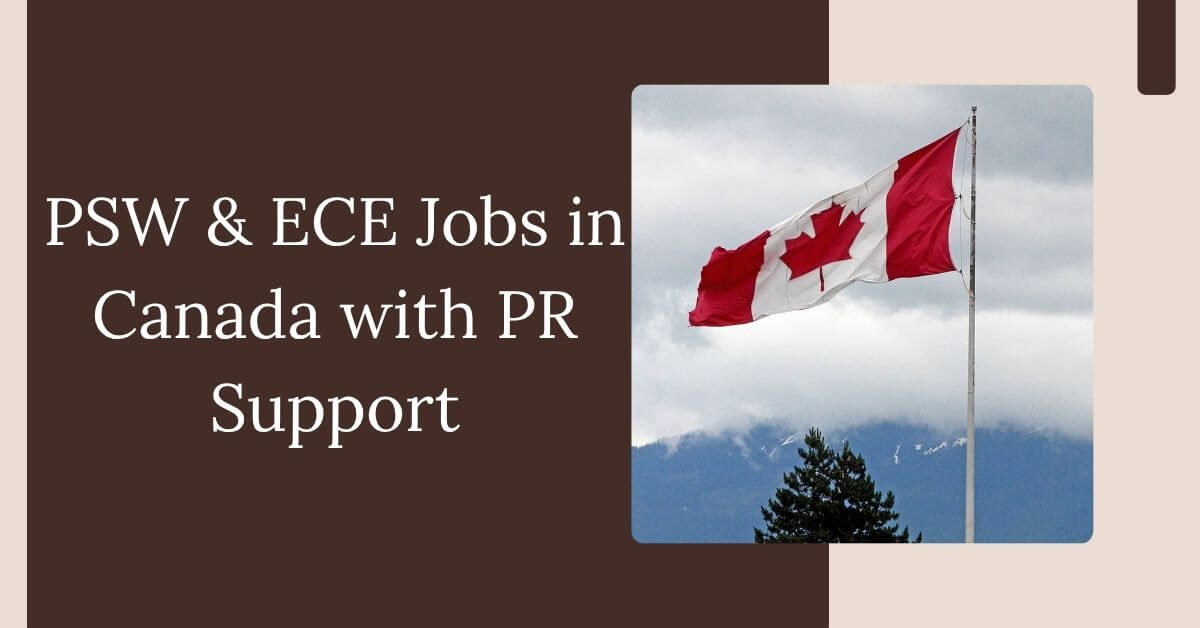In 2025, Canada made it much simpler for graduates of Early Childhood Education (ECE) and Personal Support Worker (PSW) programs to acquire Permanent Residency (PR).
Canada has made immigration channels for talented individuals in these vital areas a priority due to the country’s growing scarcity of childcare and healthcare experts. You are more in demand than ever if you hold a PSW or ECE credential.
Check More: Sudbury Designated Employers Announced for RCIP & FCIP PR
PSW & ECE Jobs in Canada with PR Support:
Step 1: Choose the Right Program to Start Your PR Journey
The first step to obtaining Canadian permanent residence is enrolling in an approved educational program. Considerations for each career are as follows:
Regarding Personal Support Workers:
The majority of PSW programs last six months or less.
Job Vacancies for Personal Support Workers
Permission: If the course lasts less than six months and you are already in Canada, you might not require a study permission.
Institutions: Seek out universities that provide employment-focused PSW training, such as Pharma Medical Science College of Canada or NBBT College in New Brunswick.
Relevant NOC codes for PR:
NOC 33102: Nurse aides and patient care assistants
NOC 44101: Home support workers and caregivers
Eligible PR pathways:
Healthcare Category Draws: Express Entry
Pilot Program for Home Care Workers (Starting in 2026)
Provincial Nominee Programs (PNPs), particularly in New Brunswick and Ontario
For Early Childhood Educators (ECEs):
Training: Participate in courses approved by the provincial oversight organization.
Colleges to consider: Two colleges that provide flexible ECE credentials are Seneca Polytechnic in Ontario and Douglas College in British Columbia.
Job Vacancies for Early Childhood Educators
NOC code pertinent to PR:
Early childhood educators and assistants (NOC 42202)
Eligible PR pathways:
Pilot Program for Home Child Care Providers (Starting March 2026)
Canadian Experience Class: Express Entry
Programs for Provincial Nominees (BC and Ontario)
Step 2: Gain the Right Work Experience
Education alone isn’t enough—you need Canadian work experience in the correct NOC code to qualify for most PR pathways.
For PSW Graduates:
Work in the following NOC roles:
NOC 33102: Best for Express Entry and Ontario PNP draws
NOC 44101: Required for the Home Care Pilot
Experience Requirements:
6 months: Minimum for Home Care Worker Pilot (with a valid job offer)
1 year: Required for Express Entry (Canadian Experience Class); experience can be split between two eligible NOC B roles
For ECE Graduates:
Work under:
NOC 42202: Early Childhood Educators and Assistants
Experience Requirements:
For the Home Child Care Provider Pilot: 6 months plus a job offer
1 year total: For Express Entry, a minimum of six months must be spent in NOC 42202, with the remaining time spent in a TEER 0–3 job.
High-Demand Provinces:
British Columbia – with dedicated PNP streams for ECEs
Ontario – prioritizing early childhood educators in immigration draws
Canada’s aging population is driving long-term demand for caregivers. By 2030, over 25% of Canadians will be over the age of 65, creating a continuous need for PSWs in hospitals, nursing homes, and private care settings. At the same time, government investments in affordable childcare have led to a nationwide expansion of early childhood education, especially in urban centers like Toronto, Vancouver, and Calgary, where licensed ECEs are highly sought after.
To address these workforce shortages, Immigration, Refugees and Citizenship Canada (IRCC) has updated the Express Entry system to include category-based draws. In 2025, ECEs and PSWs now benefit from lower Comprehensive Ranking System (CRS) cut-offs, making permanent residency more accessible than ever.
Frequently Asked Questions:
-
Who can apply for PSW & ECE jobs in Canada with PR support?
International candidates with qualifications in Personal Support Work (PSW) or Early Childhood Education (ECE) can apply. Some employers also offer visa sponsorship and PR pathways.
-
Is Canadian experience required for these jobs?
Not always. Some employers accept international experience, especially if supported by valid certifications or equivalent credentials.
-
How does PR support work for these roles?
Employers may assist with Provincial Nominee Program (PNP) applications or other immigration streams that lead to Permanent Residency (PR) in Canada.

